Before we left on our trip, one of our main sources for armchair sailing was the Newly Salted project (developed by Livia on SV Estrellita 5.10b). For us it was an indispensable source of information from the trenches, and it gave us plenty of conversation fodder as to what challenges we would soon be coping with and what gear we should be unsurprised to see break down.
Now that we’re all broken in, we offer our own humble submission to a) try to pay back in some small measure the advice and encouragement we gleaned back when we were still dreaming and fretting; and b) talk about ourselves at length under the guise of an interview.
—————–
The blurb:
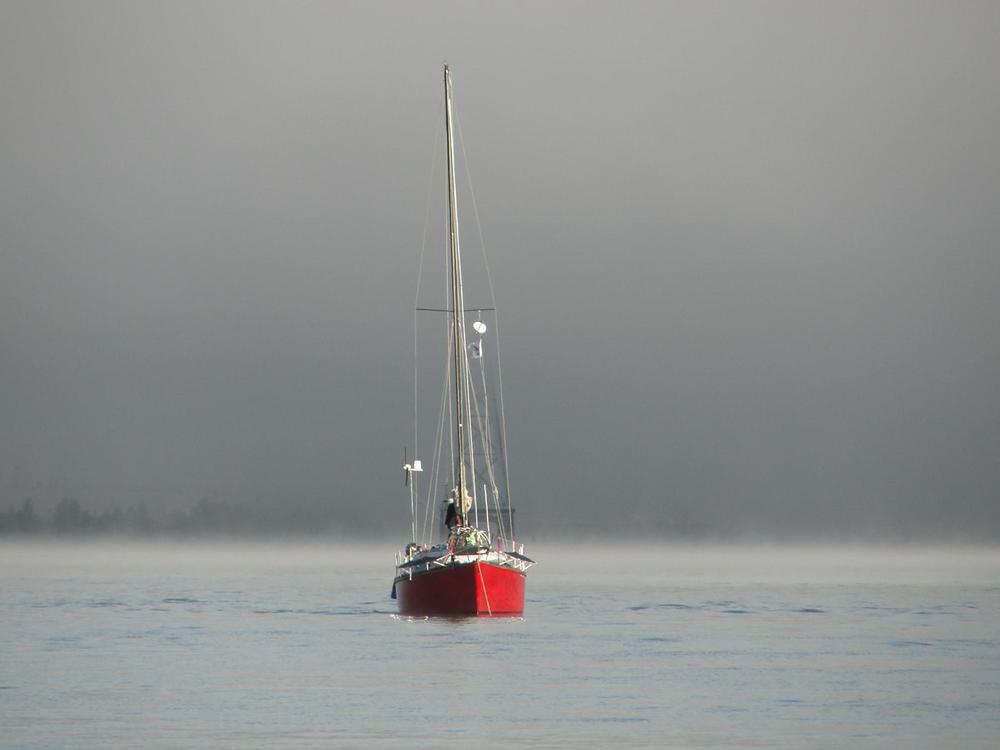 SV Serenity on the Columbia River near Rainier, OR.
SV Serenity on the Columbia River near Rainier, OR.
In August 2012, Jeff and Harmony laid down
their land-based responsibilities, sold most of their possessions, moved onto
their 30 foot sailboat in Portland, OR and shoved off on an adventure. After a
month of serious (and unbudgeted) boat repairs at the mouth of the Columbia
River, they set sail for anywhere further south. Over the past year they have
cruised along the Pacific coast of the US and Mexico and are currently based
out of Puerto Chiapas, Mexico. Their beloved boat, SV Serenity, is a
Nightingale cold-molded cedar-strip planked sloop, which originally hails from
Seattle, WA.
You can follow along via our blog: www.taketothesea.us, or on Facebook: www.facebook.com/taketothesea
The dirt:
What (if anything) do you wish someone had told you before you started cruising?
J: I wish we had known more about the “seasons” of cruising and their associated weather patterns and ocean currents. I thought I knew the gist before we left, but it was a surprise to me to discover how much they can narrow your travel options and your feeling of freedom. When we set out we had zero itinerary beyond getting to La Paz, but once we got there we were all of a sudden beset with all the natural rules: If you want to go south, you have to leave by X time if you want wind at your back and get there by Y month if you want to avoid hurricane season. If you are interested in a crossing, there is a relatively small window of time in which to set off a chain of events or else wait for next year. If you go up into the Sea, don’t stay too long or you’re committed to staying there through the brutal summer. Oh, and heading back up north is going to suck pretty much no matter what time of year you do it.
We went from feeling like the world was flat all around us to feeling like we were threading a needle of time, weather, and money. Of course I’ve never read the Cornell World Cruising Routes book either, so it’s definitely my fault and I’m also now helplessly gullible regarding all the old sea wisdom that has come our way.
H: Three things. 1) It takes a LONG TIME to get anywhere, especially if you’re determined to sail. Slow down. Enjoy yourself. Goals can be great, but don’t get hung up on them. 2) Wind and water will expose and exploit any vulnerability you have, be it physical, mental, emotional or otherwise. In other words, prepare to have some pretty intense self-talks, invest in some fist pumping, booty shaking music and don’t be afraid to strike a Super(Wo)Man pose every now and again just to feel like you have your s^&% together. 3) A sense of humor is the most important thing you can bring along with you on your trip…second only to mechanical ability and perhaps guts…oh and actual sailing knowledge/experience.
As you started cruising, what transitions did you find the most difficult?
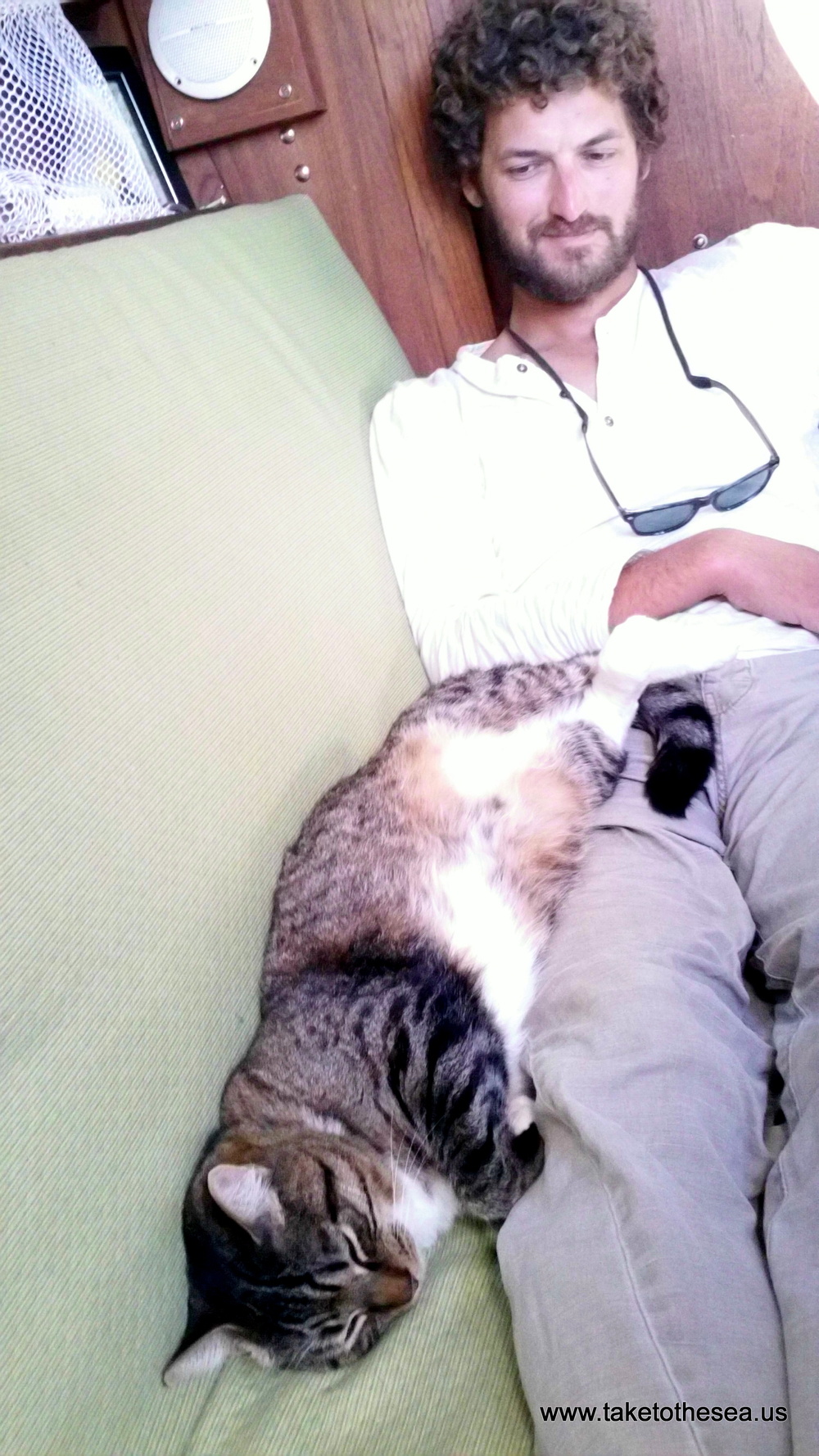 Jeff and our cat, Tack, after a long passage.
Jeff and our cat, Tack, after a long passage.
J: For me it was the shock of just how exhausting it would be to sustain continuous travel. When we started we were only focused on getting south, reaching a destination. We allowed ourselves some opportunities to rest or explore a place in passing, but the majority of our time was devoted to preparing for the next leg of the trip. This also caused us to motor more than we planned just to get through areas that we’d heard would be difficult to traverse. By the time we reached La Paz, we were physically, mentally, and emotionally exhausted.
Since leaving the Sea of Cortez, Harmony and I have adopted a “comfort first” sailing policy. Serenity has the multitudinous blocks, poles, and hard points of a racing boat, which we use to pursue comfort like methodical scientists. We will sacrifice a knot of speed if it means that the overall trip is gentler through the wind and waves, and we avoid using the diesel engine as much as possible because it shatters the calm. Tack (our cat) is our canary in the coal mine and chief metric for judging when a sail configuration has gone from manageably comfortable to ‘something must be done’. This codependency likely has the effect of making Harmony and me less extreme than seafarers of yore, but we are no less action-focused and a whole lot happier.
H: That’s a great question. I’d have to say the whole cooking thing. We have a very rudimentary kitchen. Our diesel stove is great for the North Pacific coast where you can just keep it lit all hours of the day, but it is decidedly less awesome when the air and water are 94 degrees (stifling!). Fortunately I’ve become very adept at cooking pretty much everything on our magma grill in the cockpit and Jeff recently built a gimbaled stove, which is great for simple one pot meals while we’re on passage (or when the mosquitos form a dense cloud around our boat and I don’t feel like subjecting myself to their insatiable appetites). Most people probably won’t struggle with this same challenge. Every visit to another boat results in maddening galley envy.
What mistakes did you make as you started cruising?
J: Not enough netting! On our first passage we had stuff flying out of cubbies, rolling across the floor, and flopping out of cupboards that didn’t have good latches. Additionally, there were all kinds of little preparation steps that we had to learn to do before we set sail (e.g., boil some water for later, make sure all the knives are put in drawers, have all potential clothing needs ready), because we learned that it’s better to assume that the ride will not be as smooth as you hoped.
H: Oh goodness, too many to recount. We have learned quite a few things the hard way; it’s hard to pick one. I think one of the earliest lessons I learned (while we still had our training wheels on in the Puget Sound) was the importance of tidying up your docklines. A simple but important lesson. One of our docklines went overboard and fouled our prop. Since it was my fault I insisted on jumping in to rectify the situation (also, Jeff is allergic to cold water). Even though it was a calm, beautiful day, the experience was utterly terrifying. Let me just say that jumping into 52 degree water stops your heart and, in doing so, shatters any disbelief you may harbor regarding your own mortality. It took me a long time to not be paralyzed by my fear of cold water. Being in 94 degree water helps with this quite a lot…but now my fear has just transferred to getting eaten by a shark. Also, don’t start a thread on Cruiser’s Forum about bureaucracy in Southern California and forget to babysit it…word to the wise.
What do you find the most exciting about your cruising life?
J: I love being on the water at nighttime, whether we’re anchored or underway. There’s just a lot of magic to the experience that only pales in the telling of it. There is so much beauty around us in general that the quotient of “wow” moments is far higher than I’d imagined.
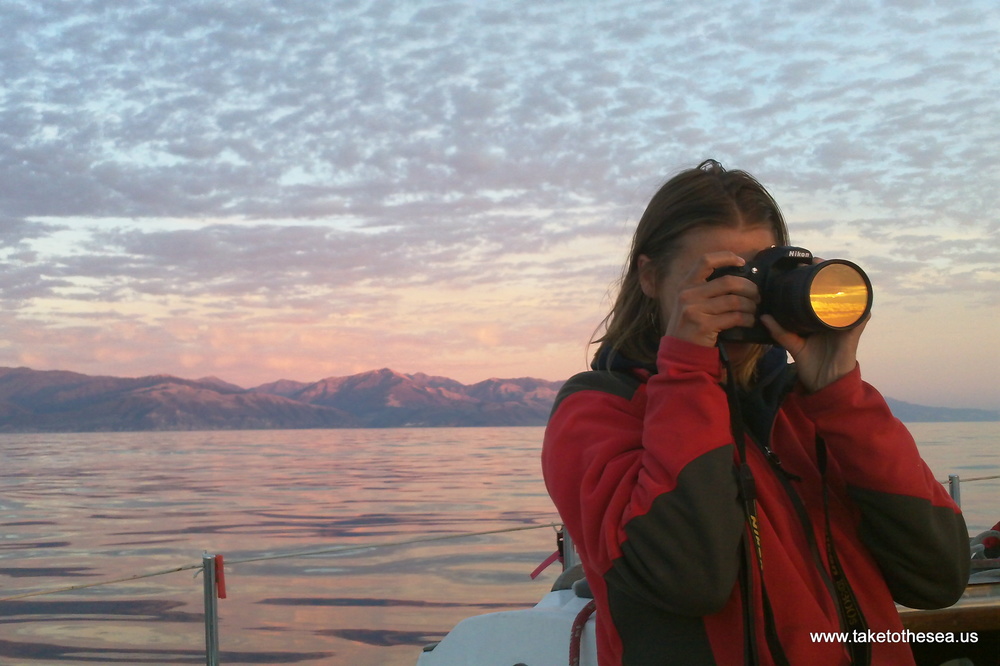 A picture of Harmony taking a picture of the most beautiful sunset EVER.
A picture of Harmony taking a picture of the most beautiful sunset EVER.
H: I really love long passages, as long as the weather isn’t too crazy. While I wouldn’t necessarily characterize most of our passages as “exciting” (we spend the majority of our time doing wild and crazy things like sleeping, bathing, cooking, reading, petting our cat and playing card games), it’s one of the realizations that surprised me. I was expecting to simply endure passages rather than cherish them. “Unplugging” is really difficult for me, so the self-imposed exile can be quite welcome and revitalizing. I’ve also found that I really enjoy living off of the grid (for the most part). Again, not “exciting” per se, but definitely rewarding. In that vein, it’s interesting to see the spectrum of human experiences in the places we’ve visited. It shows us that we can choose how we live; we can choose to live simply and still lead a full life. Oh, also, my husband is MacGyver resurrected and it’s fun to see his latent tinkering abilities emerge.
What do you dislike about cruising that surprised you?
J: There’s an experience that I think is maybe specific to younger people cruising (although maybe not), in which some of the other cruisers, out of helpfulness and experience, assume that we don’t know what we’re doing. We’ve had people telling us how to dock, how we should anchor, how we should break loose an anchor, or how some piece of our boating system is inadequate – all unbidden and usually right in the middle of us completing said action or maintaining said boat system (which we have found entirely adequate). When people try to grab our dock lines or push on our stanchions or plan our next moves for us, it’s so hard not to say, “This has been our boat for five years! We just came 2,000 miles! We’ve got a system!”
H: It depends on which day you ask me. Right now we’re home (in the Pacific Northwest) for a visit, so I’m ridiculously nostalgic and positive. If you asked me after a gnarly passage I’d probably tell you that I dislike everything about cruising, but today I’m having a hard time coming up with something concrete.
What is something that you read or heard about cruising, that you didn’t find to be true?
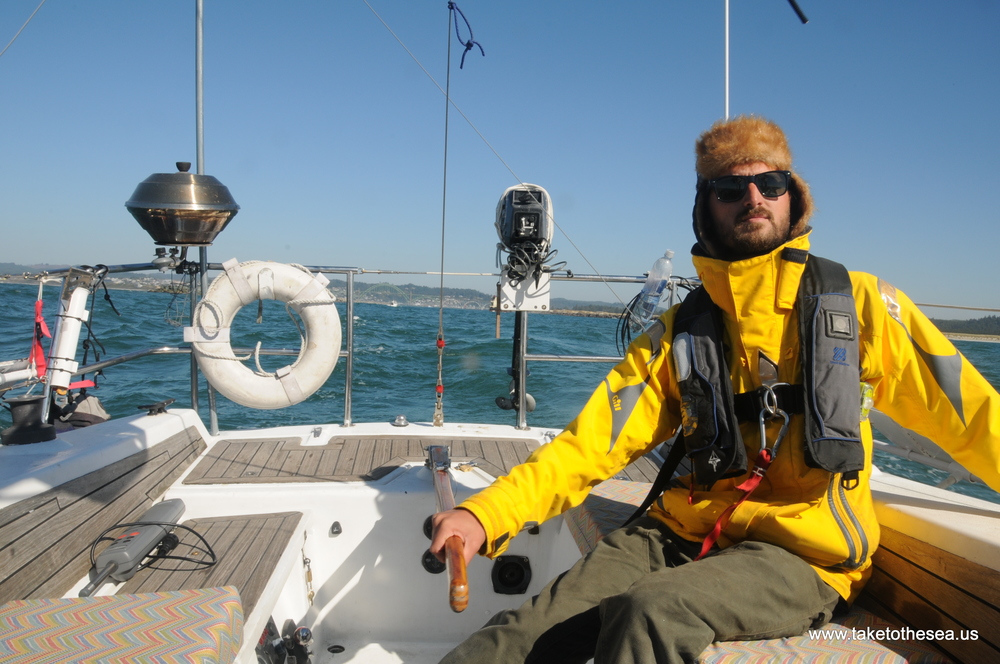 Leaving Newport, OR on a cool, fall morning.
Leaving Newport, OR on a cool, fall morning.
J: There are some really incredible experiences to be had out here, that’s for sure, but it’s also true that we have traded the difficulties of one life for those of another. It is no more or less meaningful than life on land, nor will the simple fact of it confer upon you transcendence. You will find no end of white sand beaches, but we have found no easy paradise. Cruising is an escape, but in all the ways that don’t matter. That’s what I found anyway, but at least the water is warm now and man is it pretty!
H: Jeff did most of the reading and preparing. I was busy finishing up my Master’s thesis and didn’t have as much time to think and dream about our big adventure or to establish many expectations. I will say that I did expect a different community dynamic. We’ve made some great friends but we have spent a disproportionate amount of time alone on passages and in anchorages. It turns out that we were generally behind the pack or had a different route/itinerary than most people we met, making it difficult to be at the epicenter of social happenings. It can also be difficult to infiltrate well established social scenes in certain places – some people are more welcoming than others and we tend to be a bit shy. Sometimes it feel taxing to cultivate new relationships everywhere we go, and sometimes it comes naturally. I’m excited to report that when we reached Chiapas we met several awesome cruisers that we hope to “buddy boat” with in the future.
What is something that you read or heard about cruising, that you found particularly accurate?
J: We’d heard from a couple sources that it takes about six months to settle into the cruising lifestyle, and that proved more or less true. The first six months were all about getting south. We were frantic, we were uncomfortable, and we didn’t have all the little systems of living figured out. After the six month mark we paused for breath and decided to slow down and focus on doing what we wanted to do instead of what we thought we should be doing. Being out here in a lifestyle with fewer time queues has been a good exercise on discovering what our natural pace is and living within it. After six months, too, we got more used to the feeling of not having the structure of a job and a stationary location.
H: I love having books onboard that provide a lens through which to process this whole experience, give us tips and tricks for improving our systems and help us learn new skills. There’s a lot of great information out there. I really appreciated the Sensible Cruising: The Thoreau Approach, which advocates for smaller boats (“pocket cruisers”) and simpler systems. It also provides meaningful insight into how to approach cruising from a more philosophical perspective. We’re usually the smallest/funkiest boat in an anchorage and it’s nice to know that we’re not alone in that respect.
Is there something you wish you had bought or installed before starting out?
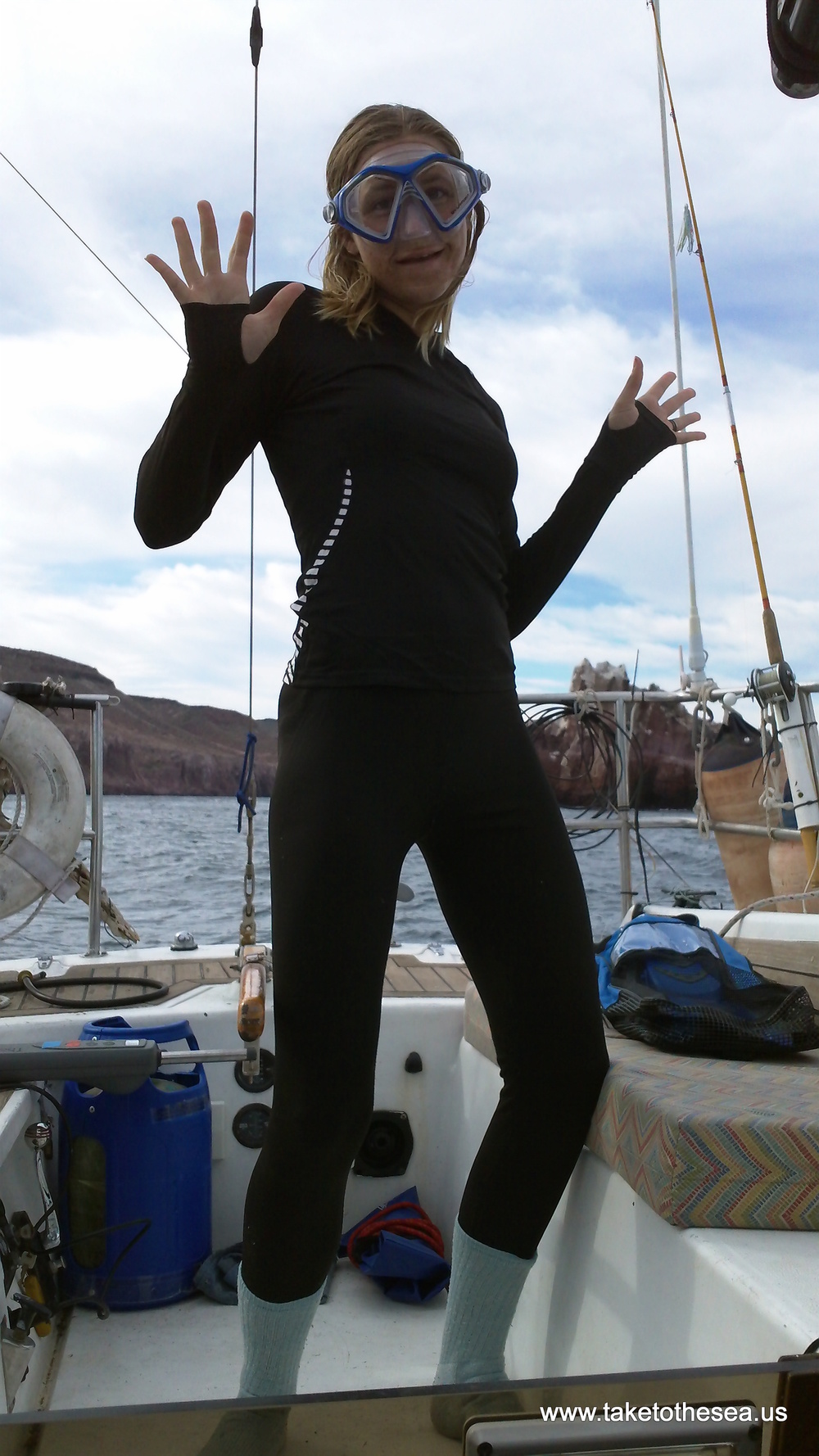 Poor man’s wet suit.
Poor man’s wet suit.
J: I’m regretting that we never built a proper dodger and bimini. I sewed our own out of sunbrella and clear plastic (sans a frame), but it requires a lot of babysitting to be useful for keeping out the sun while underway. We’ve only had rain a couple times so far, so I don’t yet know how well it’ll protect us when we get to Central America. Also, I wouldn’t mind a watermaker, though it’s outside our budget. Our tanks let us go about three weeks between top-ups, which turns out to be our limiting resource most of the time.
H: I think a windvane would be pretty awesome, especially if we ever decide to do some trade wind sailing. I wish we had invested in wetsuits for snorkeling adventures in the Sea of Cortez (water temperature was in the 60’s!). We just donned polypropylene long underwear and wool socks and tried to fill our heads with images of Mexico…wait a second…
What piece(s) of gear would you leave on the dock next time? Why?
J: With a boat as small as ours, we’ve really had to keep our gear down to the essentials. I can’t think of anything that we haven’t found indispensable at one time or another. Though I will say, the folding bikes, while amazing to have the three times that we bothered to pull them out of the quarterberth, are a bit of a pain. There aren’t a whole lot of roads where they’re appropriate, and if you’re out at anchor they would be a nightmare to load in and out of our little porta-bote.
H: I feel like we did a pretty good job leaving things behind that we didn’t need. When we left home we realized that we would probably need to purchase things along the way (lots of Amazon purchases right before we crossed the border). We kind of let the trip dictate what we needed, which worked pretty well. Jeff would likely tell you that we have too much kitchen stuff, which is partially true. He has to steer me away from the kitchen section of pretty much every store we enter. Although we’re “gear light” we still have a lot of clutter, but that’s just par for the course on a 30 foot boat.
What are your plans now? If they do not include cruising, tell us why.
J: We’re still working our way south into Central America, but we’ve had to start thinking about how we’re going to get ourselves home eventually. We always planned a general timeline of two years because we know we still have careers and babies in our future, and we haven’t found a way to make this life pay for itself. We’re not too interested in bashing north, but do we have the guts (and the boat) to cross to Hawaii and back to the PNW from there? What about the South Pacific? If we don’t go now, will the islands still be above water when/if we can afford to do this trip again someday? Should we just ship the boat home? Should we sail to Australia and sell it? Is there any reason to go through the Canal to the east side? All these questions keep us entertained in conversation at the dinner table.
H: Cruise for another year or until our money is gone or until we throw our hands up in the air and say “whose bright idea was this anyway?” Who knows. We change our minds pretty much every day. Some days it’s more about the lifestyle, some days it’s more about the sailing adventure, some days it’s more about travel and culture, some days it’s just about maintaining the momentum.
What question do you wish I would have asked you besides the ones I’ve asked you and how would you answer it?
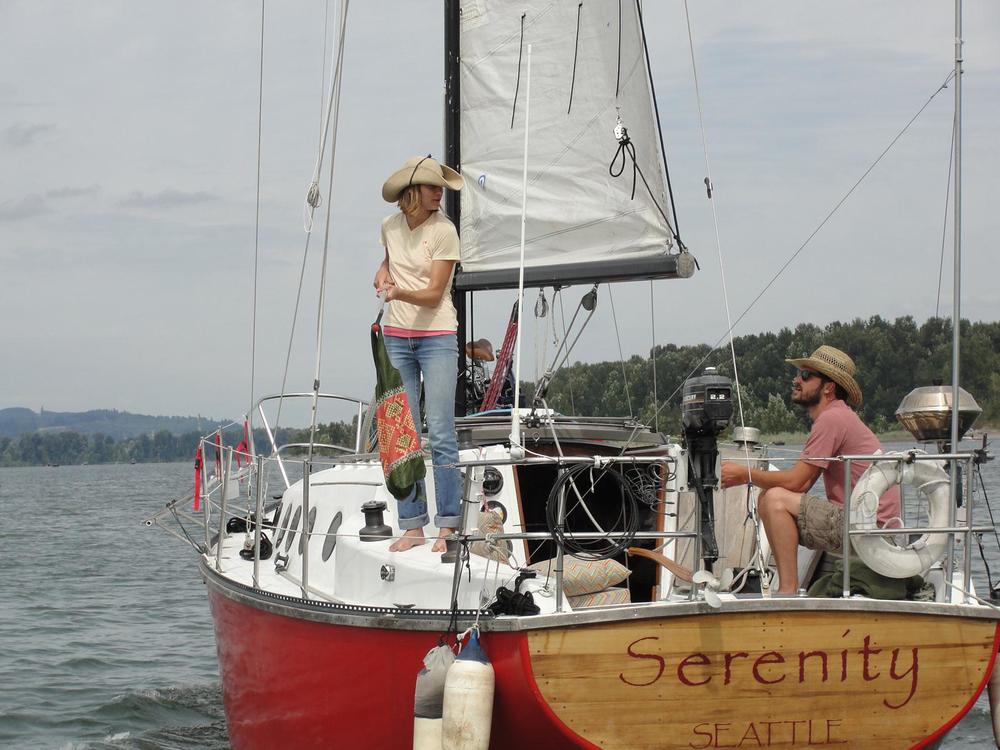 Meet the co-captains.
Meet the co-captains.
J: How do you make decisions underway? We adhere to the “alternating captains” approach when we’re on passage. The person on watch gets to make all decisions regarding navigation, sail trim, sail selection, distance from shore, angle to the wind and waves, necessary chores, and so forth. The other person is on hand when necessary to assist or offer a second opinion, but ultimately one person is in charge at a time. We like this system because we both tend to be a) stubborn and b) indecisive. It’s nice to routinely be able to completely disengage from operational concerns (as much as possible, with an ear always open for changes in sound), but if you end up disagreeing with the other captain’s choices, you can feel free to change them on your shift. Sometimes this leads to us sailing in a zig zag when we have different preferences for how far offshore to be, but overall we’ve found that it increases the peace to have these periods of enforced patience for each other’s strategies, comfort tolerances (read: laziness), and experimental sailing theories.
H: A good album for rough seas? We really, thoroughly enjoy Of Monsters and Men’s latest album My Head is An Animal. They hail from Iceland and have an intimate relationship with the sea, which is apparent in a lot of their music. It’s also an awesome album to sing along to if you’re caught hand-steering through some sloppy seas. Music can make uncomfortable or scary situations more manageable, boring situations more interesting and interesting experiences downright magical.
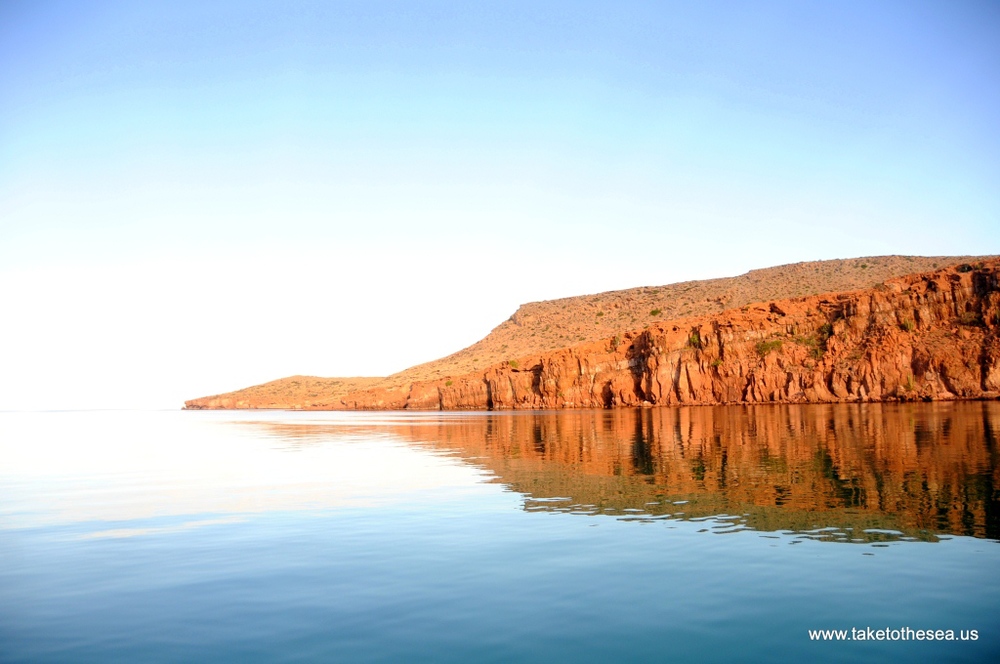 El Mezteno in the Sea of Cortez.
El Mezteno in the Sea of Cortez.
Love this! We hope you guys are enjoying your time in the Pacific NW, hopefully imbibing with a few microbrews along the visit. You’re probably due for something other than Pacifico, huh? Miss you guys!
– Katie and Mark
SO MUCH GOOD BEER! Drinking a Porter or a Stout now feels like a full meal compared to the Mexican beer. The weather has been absolutely amazing and I’m glad to do a little bit of backpacking and camping. I’m sad that we’ll just miss you guys in September. We’re eager to hear what’s next for you two! All the best! H&J
I had to look up the Cruiser’s Forum thread. That was pretty amusing. All those fine people from SCal going out of their way to prove your point.
I bet the irony was completely lost of them too!
Haha – in many ways I’m glad I didn’t babysit that thread, I think I would have just dug a deeper hole. It did make it quite apparent, however, that my grasp of the English language is lacking. I was amazed at how many different ways my story could be (mis)interpreted. Bureaucracy is certainly a touchy subject.
What an excellent interview – refreshingly honest and entertaining. Your explanation about your "alternating captains" approach made me laugh out loud. David and I can relate in so so many ways. I’m definitely going to look up Sensible Cruising: The Thoreau Approach. Less is more!
We’re gearing up to head back to the boat in early November. Hope to see you guys down there and hopefully we can experience Central America together a bit!
Until then, enjoy your land time!
Briana
S/V Tusitala